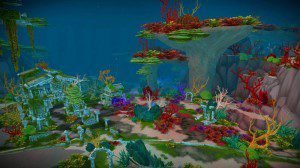What’s your favourite game? Pacman? Doom? World of Warcraft? Most of us have spent hours immersed in video games, many still do. Prof. Gordon Calleja studies why and how we get so involved in games. Science writer Dr Sedeer El-Showk found out about Calleja’s latest book and game that are gaining worldwide fame.
Gordon Calleja has a dream job: he studies video games. It may sound like frivolous fun, but his work is serious research. He examines how people perceive the world around them and interact with it. His research blends aspects of philosophy, neuropsychology, and literary theory with futuristic concepts like cybernetics and post-humanism; his papers are peppered with references to Wittgenstein and Borges alongside quotes from avid gamers. In his book In-Game: From Immersion to Incorporation, published last year by MIT Press, Professor Calleja tackles the question of how we experience games – how the barrier created by the screen and the controls dissolves into a sense of really being there. ‘Ultimately,’ he says, ‘studying presence in games is asking how we are conscious here in the physical world.’
A revolution in gaming
Professor Calleja didn’t start out in game studies — a field which didn’t even exist in his youth. As a student at the University of Malta (UoM), he studied literary theory and media communications before finding work as a teacher and auditor. Still, his involvement with games and game design dates back to his earliest years. ‘My dad used to set me up with hex paper, some dice, and a bunch of figurines,’ he recalls. ‘It was his idea of babysitting.’ The young Calleja grew up playing and designing games, and even won the New Zealand Blood Bowl (tabletop game) championship as a teenager. Despite this strong start, games became a smaller part of his life as an adult, giving way to work and other commitments.
“When intention and action flow seamlessly from each other in a rich virtual environment, the line between player and avatar fades away and the world of the game becomes real”

Video games underwent a major transformation during Professor Calleja’s hiatus. The proliferation of broadband led to the development and growth of Massively Multiplayer Online Games (MMOGs) like World of Warcraft and Second Life, persistent online virtual worlds populated by people from across the globe. Through their avatar, players of MMOGs interact with one another and with the virtual world, exploring, completing quests, and even getting married. ‘I got a bit glassy-eyed with amazement at the realisation that there were other people actually connected to the same world,’ said Professor Calleja, describing his first experience in an MMOG. He became fascinated with understanding how players relate to these game worlds. As he learned more about the subject, he realised that there were significant gaps in our understanding which he could address thanks to his background. He switched his Ph.D. to game studies, launching a research career that led to him heading ITU Copenhagen’s Center for Computer Game Research at the age of 31. Five years later, he became director of the Institute of Digital Games at the UoM.
Bringing in a new perspective
One of the problems Calleja faced was the description of how players become involved in a game’s virtual world. Despite the question’s importance, researchers had been using terms like ‘presence’ and ‘immersion’ without a precise definition, leading to confusion. Calleja described how the same terms were being used for two different experiences: a sense of absorption and of being present in another place. Language from older media was being used to describe games, a new kind of medium. Unlike films or books, games offer a sense of agency by acknowledging the existence of the player in the virtual world and responding to their actions. While it’s perfectly possible to be deeply absorbed by a book or film, only the agency and feedback loops afforded by games can deliver the sense of inhabiting another world.
Professor Calleja took a new approach to the question. Rather than getting bogged down in the vague terminological issues of presence/immersion, he stepped back to analyse the experience of playing a game, breaking it down into six different aspects of involvement. The player involvement model, which he developed in his doctoral thesis and wrote about in In-Game, was received extremely well by the research community. It provides a general framework for understanding how games can make players feel as though they’ve been transported to a different world, offering a solid foundation for future research in the field.
The model describes six aspects of involvement: mastery of the control system, an awareness of space, planning and achieving goals, following and creating a storyline, feeling emotions in response to the story and our actions, and sharing an experience and space with others. Unlike other media, games bring these aspects together to give us the sensation of inhabiting a different world. Each aspect can engage us on the micro-scale of moment-to-moment involvement while playing a game or on the macro-scale of involvement between sessions, when players make plans, revise strategies, or reflect on their experiences. Calleja also points out that the six aspects aren’t independent, but are experienced together and in relation to each other; he likens them to stacked transparencies.

According to Professor Calleja, when the different aspects of involvement act in concert, our attention slips away from them and we stop being conscious of the game itself. When action and intention flow seamlessly from each other in a rich virtual environment, the line between player and avatar fades away and the world of the game becomes real. Professor Calleja uses the word ‘incorporation’ as a metaphor for the twin dynamic at work: internalising the environment and controls of the game while becoming embodied (made corporal) within that environment.
The sense of embodiment and the reality of games is clear in the language players use to describe their experience. In his interviews Professor Calleja found that they consistently say ‘I’ instead of ‘my character’ and recount
events as though they were real. ‘I just stopped, and stared at [the cathedral]. I worked my way around it as much as I could to see if from all angles and ended up on a rise a little above it, just watching it. I don’t remember the time of day, but it might have been [around] sunset and I swore, I could practically feel the breeze on my face and hear the wildlife.’
In many ways, we experience virtual worlds the same way we interact with this one: through our senses. ‘How we’re aware of physical reality and virtual worlds is not different at all,’ said Professor Calleja. ‘I don’t see any difference between the real and the virtual whatsoever aside from the physicality and haptic feedback of one. Whether you can give the right feedback to the brain is [just] a technological question.’
A different kind of game
Having designed games and game systems ever since his father used to entertain him with dice and figurines, Professor Calleja finally decided to try his hand at making a video game. Unsurprisingly, his goal was something that hadn’t been done before: making a game based on a song. Will Love Tear Us Apart is a free browser-based game based on Joy Division’s cult hit Love Will Tear Us Apart; the game consists of three stages, one for each verse of the song. It’s a unique game which takes advantage of our expectations in order to explore the challenges and emotions of a troubled relationship. I asked Professor Calleja about his goals in adapting the song. ‘I wanted to design a game that was true to the essence of the song,’ he said, ‘not just to the story or the atmosphere.’
“‘Humans have always been story-tellers and created worlds, but now we can inhabit each other’s imagined worlds and create things together”

Will Love Tear Us Apart focuses on emotional responses at the expense of other aspects of involvement; it lacks the spatial involvement and other aspects that create a strong sense of incorporation in games like World of Warcraft or Planetside. Calleja’s design breaks with one of the traditional goals of games; rather than trying to entertain players, Will Love Tear Us Apart aims to provoke a response from them. The resulting experience feels different from traditional games — it’s more like an emotional journey than a game.
‘I wanted to turn it around and look at how games control us,’ said Professor Calleja. Games are loaded with
a range of implicit assumptions, from the effects of our actions to the idea of ‘winning’; Calleja skillfuly subverts these in order to create emotional impact. ‘It was very hard to get the difficulty just right; we had to tweak it a lot,’ he said. ‘You have to believe you could have succeeded in order to feel cheated. You have to feel like you had a chance. Hopefully the player will reflect about that experience afterwards.’
Can we expect to see more games from Professor Calleja? ‘Definitely,’ he replied instantly. Assuming there’s enough funding, he’d like to explore the range of possibilities for games inspired by songs or poems, as well as a follow up on a few other ideas. Given his record to date, it will be exciting to see what the future brings.
Understanding a changing world

For the moment, Professor Calleja is turning his attention to understanding how players construct and relate to the narratives of games. Traditional media convey a designed, structured narrative to the reader or viewer, but games bring an additional layer to this as players create their own stories individually and together. ‘All of a sudden you have elements of the theatrical as our actions become part of the narrative,’ observed Calleja. Narrative theory, which has been based on an analysis of traditional media, will have to be updated to take these aspects into account.
Professor Calleja spoke eloquently about the importance of researching games and virtual worlds. ‘Virtual worlds are here to stay,’ he said. ‘Humans have always been story-tellers and created worlds, but now we can inhabit each other’s imagined worlds and create things together. I think it’s important to critically examine this and understand how it happens, so we can better understand ourselves and our experiences.’ As we march into a future where the virtual and physical overlap ever more heavily, the science of games may prove essential in understanding the world around us, a world we both inhabit and create. •
Sedeer El-Showk is a freelance writer based in Finland who blogs at http://inspiringscience.wordpress.com and tweets as @inspiringsci






Comments are closed for this article!